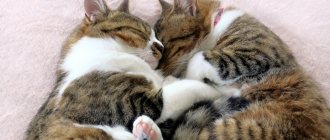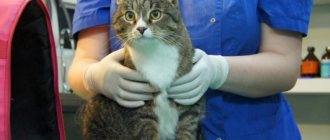10603Administration
Sterilization is considered an absolutely safe veterinary operation, which has been successfully performed all over the world for many years, but whatever it is, it is an intervention in the nature of the animal and it is always difficult to predict how it will affect the cat. Often owners are faced with the problem that the cat has become aggressive after sterilization.
An animal that has been docile and gentle for many years suddenly suddenly shows attacks of aggressiveness, rushes and hisses at its owners, and sometimes can even scratch painfully.
Can a cat ask for a cat after sterilization?
- Sterilization
The problem of unwanted kittens worries pet owners no less than the behavior of a pet during heat. Captured stray cats are sterilized by ligating the tubes connecting the ovaries to the uterus. After sterilization, the cat will ask the cat: scream, mate, but will stop bringing kittens. The sterilization operation is carried out because it is simple and does not require large material costs.
But for the owners, this is only half the solution to the problem. After all, screaming, marking territory, scratching, rubbing against legs, rolling on the floor do not go away. Therefore, sterilization has not become widespread among domestic cats.
- Castration
Two methods of castration are popular:
- oophorectomy, when the ovaries are removed
- Ovariohysterectomy, in which the ovaries and uterus are removed.
This is the most expensive and most dangerous operation in terms of complications, but also the most reliable way to rid an animal of heat. However, in some cases, the cat continues to walk even after castration.
Why does a cat meow?
Every owner who has or had a cat has at some point wondered, why do cats meow? This, in my opinion, is an important and quite interesting question, because knowing what your pet wants from you is simply necessary. Knowing the reason for meowing will help you please your cat without any problems. So, let's figure out why your cat meows?
A cat may meow for the following reasons:
- The most likely reason for meowing is a request for food. Most often, a cat meows if you give it food outside of its daily routine. Accordingly, as soon as she wants to eat, she immediately begins to meow.
- Attracting attention can also cause a cat to meow. Why meow? You ask. But because, unfortunately, the cat doesn’t know how to talk to people yet.
- If you pay little attention to your pet, then meowing may occur due to a lack of love and affection. To correct this, try to pick up your pet and pet it more often. When he climbs onto your lap or onto your keyboard, don't ignore it, just give him 5 minutes and he'll be happy.
- If you have not trained your pet to patch, then the meowing may be hidden as a request to go to the toilet. To avoid this, you must accustom him to a patch from a very early age, or better yet, as soon as you buy a kitten.
- Cats, like all other creatures on Earth, are capable of experiencing pain. And this can also be the reason for meowing. To find out if this is true, go up to your cat and feel it from all sides. Due to the cat's constant jumping, the paws most often hurt. If your cat meows when you press on its paw, contact your veterinarian immediately.
- Very often cats meow during sexual activity. You wouldn't wish such meowing on your enemy. You will immediately distinguish him from all the others. This is a long “meow” that is made in a loud voice. This “cry” can be eliminated by crossing a cat with a cat or by sterilizing it.
- When frightened, a cat can also meow, and if the fright is strong, it will squeal (but only once, not to be confused with sexual activity).
- A cat may meow during games. This will mean that she is enjoying the game.
- A cat can communicate not only with people, but also with other animals, so meowing when communicating is also possible.
- If you keep your pet locked up, then by meowing, the cat can make it clear that it wants to be released. Buy her a leash and go somewhere for a couple of hours. If you live in a country house, you can let it go without a leash, but it’s worth buying a collar so that if you lose your pet, the people who found it can deliver it to you.
A large number of people want to get a cat just because they like the way it meows. If you are that same person, then I want to draw your attention to the fact that there are cats that by nature constantly meow, with almost every action they take. Here are some such breeds of the cat family: Bengal cat, Abyssinian cat, Kurilian bobtail
. If you cannot understand the reason why your cat is meowing, contact your veterinarian.
Kitten meows on video
Article rating: (4 votes, rating: 5.00 out of 5) Loading.
It is not for nothing that sterilization of cats is considered one of the most typical operations: it is relatively simple and well studied, the likelihood of unpleasant “surprises” is minimal. However, in practice anything can happen. It happens that a cat screams like crazy after sterilization, driving its owner into panic. What does this indicate and how dangerous is this phenomenon?
A sterilized cat asks for a cat: 4 reasons
There are the following causes of estrus in sterilized females:
- Incomplete removal of epididymal tissue. Occurs when an unremoved piece of ovarian or epididymal tissue remains, which is capable of regenerating and partially replacing the internal secretion organ. Estrus occurs as usual, but pregnancy does not occur and the pet will not be able to bring kittens. Repeated surgery, as a rule, does not solve the problem. Not every veterinarian is able to find the criminal piece of tissue, and repeated anesthesia will harm the cat’s health. However, the chance of achieving a positive result increases if the uterus and surrounding tissue are removed.
- Development of the reminant ovary. After the removal of the reproductive organs, the pituitary gland or adrenal glands begin to produce sex hormones. Statistics show that one out of seven castrated cats can retain the ability to secrete estrogen.
- Congenital anomaly. Cells of the ovarian appendages take root in other organs.
- Development of a hormone-like tumor. The neoplasm has the ability to secrete estrogens. Pathology is observed in cats that were castrated in adulthood.
Be sure to read:
How to care for a cat after sterilization: blanket, diet, treatment and removal of sutures
The main causes of post-operative screams
The reasons are not too varied:
- Postoperative inflammation. They arise either as a result of gross violations of the rules of asepsis and antisepsis at the time of the operation, or due to the cat licking the surgical sutures, as well as scratching them. In this case, the cat screams in pain.
- Formation of postoperative hernia. It is also an unpleasant phenomenon that may be accompanied by pain and other unpleasant sensations.
- It is not good when a cat meows after sterilization, and its voice is too weak. In some cases, this behavior indicates the presence of internal bleeding. If your pet's skin and mucous membranes become uncomfortably cold, this should be reported to your veterinarian immediately.
- Fever. It happens that in some cases the operated cat’s body temperature jumps, and this is not a pathology. But in other cases, this indicates the penetration of pathogenic microflora into the animal’s body.
Sterilization took place a long time ago, but your pet is screaming as if she’s in heat?
It also happens that the operation took place a long time ago, but the cat still screams as if in heat. What is the reason for this phenomenon? It's simple. Even if the animal’s ovaries have been removed, some of the hormones are still retained in the body. A lot of time passes until their reserves are finally exhausted. Until then, the cat will constantly yell, demanding the attention of cats. Most likely, you will have to wait at least three or four months for the end of this “concert.”
Attention! If the operated cat has all the signs of estrus, she screams and even follows the owner’s heels, in no case should you use medications like “Sex Barrier” and other hormonal drugs!
Failure to comply with this recommendation leads to the development of severe hormonal pathologies. If you use these drugs for too long, even the development of cancer becomes quite possible.
What to do if the cat continues to walk after sterilization?
The owner has the following options for dealing with the pet’s wandering behavior despite the surgery:
- You need to be patient and wait until the concentration of hormones that were produced before sterilization drops.
- Carry out a repeat operation. In most cases, it is financed by the surgeon who performed the first one. However, it should be noted that all anesthesia drugs have side effects.
- If estrus occurs, use medications to regulate sexual heat, which will be prescribed by a veterinarian.
Preparations for regulating sexual heat in cats
If a sterilized cat develops heat and produces characteristic meowing, rolling on the floor, and spreading puddles across the floor, phytosterol-based calming medications are used.
In their structure, the substances contained in biological additives resemble sex hormones. The cat develops the feeling that mating has occurred and she calms down.
The advantages of the drugs are their harmlessness and mild action. The disadvantage is that they must be given several times a day for several days. The following herbal sedatives are in demand:
- FITEX is given an hour before meals or along with food, 3-5 drops per cat with food or treat 3 times a day. During the period of taking the biological supplement, the pet is transferred to three meals a day. The course of taking the drug is 15-30 days. If necessary, treatment is repeated. In addition to correcting sexual behavior, drops are used to relieve stress.
- Kot Bayun tablets are a dried extract of medicinal herbs. Give 3-4 times a day, 20 minutes before and an hour after feeding, 2 pills. The course of treatment is 5-7 days. It is recommended to use it monthly until the problem is eliminated.
- Kot Bayun infusion. It is a herbal tea in bottles. The procedure for taking it is the same. as when using tablets. A single dosage is half a teaspoon.
Be sure to read:
After sterilization, a cat sleeps a lot and is lethargic: normal or pathological, what consequences may occur after surgery
An alternative to herbal remedies is a hormonal remedy Sex barrier. An important difference from other drugs is the combination of two hormones. They enhance each other’s effects, which allows them to be used in low concentrations that are safe for health. The drugs are produced in modifications for cats, females, males and females.
A pet should not be given medicine intended for cats, because they contain too high a concentration of active ingredients. If the cat is in heat, give 4 drops per day for 3-5 days. To prevent the onset of estrus, 4 drops are administered to the cat once every 2 weeks.
Some cat lovers prefer to use tablets. The effect of 1 pill is equivalent to 4 drops. The application procedure is the same as when using drops.
How to help your pet?
There are a number of recommendations from veterinarians for the process of cat rehabilitation at home:
- you need to put the pet on the floor, since due to impaired coordination of movements after anesthesia, it may fall from a hill;
- the cat should not lie near heating appliances - this can cause internal bleeding;
- It is worth laying down an absorbent diaper, as the cat may spontaneously urinate, defecate or vomit;
- you need to put the pet on its right side to reduce the load on the heart;
- if a cat has a weakened immune system, it needs a course of vitamins and restoratives;
- in the first hours after surgery, it is necessary to measure the cat’s temperature once an hour and carefully turn it over every half hour to avoid numbness in its paws;
- if ulcers, crusts, rashes or redness form in the suture area, consult a veterinarian;
- in case of sudden vomiting, it is necessary to turn the cat’s head to the side and make sure that it does not choke;
- to prevent licking and scratching of the stitches, as well as to protect the wound from dust and dirt, you need to put a postoperative blanket on your pet;
- stitches must be treated in accordance with the recommendations of the veterinarian.
If all recommendations are followed, the cat will recover from anesthesia easier and recover faster.











